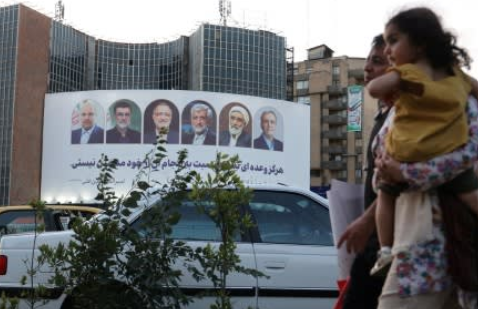So many out there are looking at the Iranian election for what it is – a total con job. The nut cases ruling the country have chosen the candidates, and they think the people will fall for their total BS. No one thinks this is a real election, other than media, who just need the stories.
In Iran, the upcoming presidential election to replace former President Ebrahim Raisi, who died in a helicopter crash, has garnered a subdued response from the public. Scheduled for this Friday, the election features six candidates, all of whom are considered hardliners and have been vetted by Iran’s ruling Islamic clerics. This situation has led to a widespread feeling of apathy among voters, particularly those desiring significant change, as the political landscape remains tightly controlled by the clerical establishment. The true feelings of the people will never be revealed as they would face arrest. Honesty is not allowed, and being critical of the powers that be can be punishable by death.
First Candidate Drops Out of #Iran‘s Presidential Election, Due to Take Place Friday Amid Voter Apathyhttps://t.co/wYuAV0Pks8
— Asharq Al-Awsat English (@aawsat_eng) June 27, 2024
Raisi’s administration promised continuity in governance, aiming to maintain stability without any disruption. This promise has been upheld, with little anticipation of change from the electorate. The candidates have tried to stir interest through various rallies, yet many citizens remain indifferent, viewing the election with a sense of resignation rather than enthusiasm.
“A high turnout has become more important for the Islamic republic than who wins the election”, says Saeed Laylaz to @FT about #Iran‘s snap presidential election this Friday https://t.co/0RyOkfVMSE
— Angeles Espinosa (@angelesespinosa) June 27, 2024
Supreme Leader Ayatollah Ali Khamenei, recognizing the potential for low voter turnout, has publicly encouraged participation. His endorsement is likely to influence conservative voters, who may turn out in support of the candidates aligned with his vision. However, the broader public’s disillusionment is palpable, with many expressing skepticism that a new president will bring about the reforms needed to address domestic issues like high inflation, limited job opportunities for the youth, and mandatory headscarf laws for women, which some still resist despite the risks.
Internationally, the election is unlikely to alter Iran’s contentious policies, including its active nuclear program, support for militant groups across the Middle East like Hamas, and its fundamental anti-American stance. These policies are largely dictated by Khamenei, and the presidency operates within the parameters he sets, further dampening expectations for any significant policy shifts.
Iran’s snap presidential election is shaping up to be closer-than-expected contest between reformist and conservative candidates, with pre-election polls showing them evenly poised https://t.co/k0BvFdduxD pic.twitter.com/8bTKshNcWf
— Anadolu English (@anadoluagency) June 27, 2024
This sentiment reflects a broader disillusionment with a political system in which many feel real change is unattainable through the ballot box. Only a true revolution will free the Iranian people. The rich Persian heritage still lingers beneath the religious extremism. There is much promise in this nation, if they could rid themselves of the nut cases running the show.
Key Points:
i. Iranians are set to vote for a new president to replace Ebrahim Raisi, who died in a helicopter crash, but voter enthusiasm is low.
ii. The election features six hardliner candidates, all vetted by Iran’s ruling Islamic clerics, limiting options for those seeking significant change.
iii. Supreme Leader Ayatollah Ali Khamenei has urged citizens to vote, likely influencing conservative turnout, amidst general voter apathy.
iv. Key issues like high inflation, lack of youth employment, and enforced headscarf laws for women contribute to public disillusionment.
v. The new president is not expected to significantly alter Iran’s domestic policies or international stances on its nuclear program and relationships with militant groups.
TL Holcomb – Reprinted with permission of Whatfinger News



